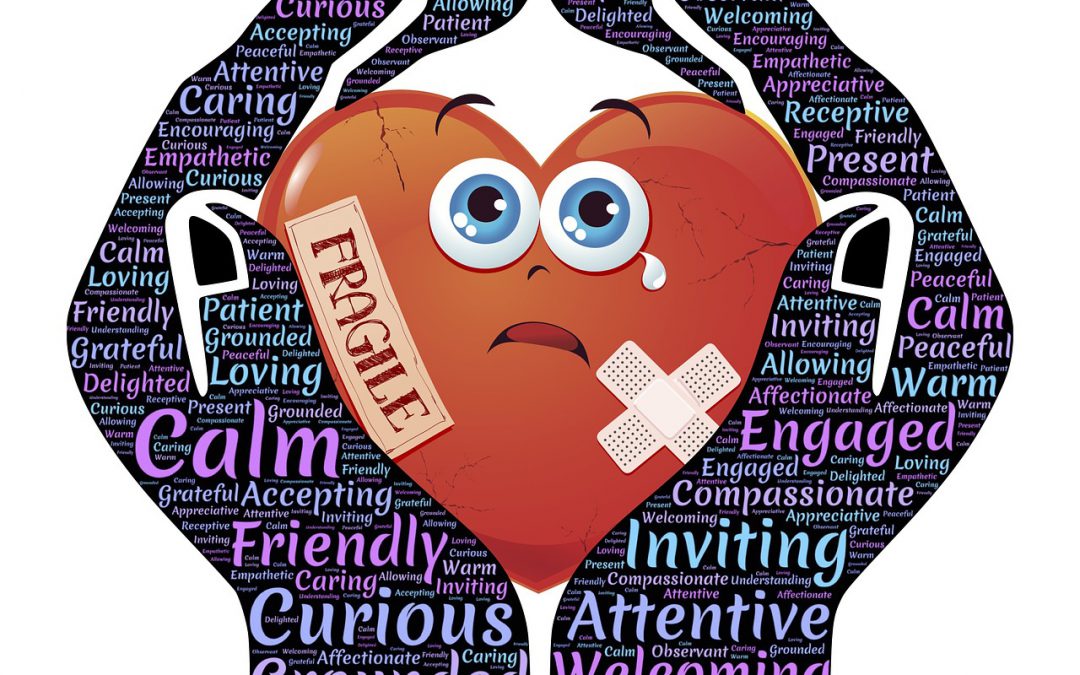
by Maureen Cooper | Mar 20, 2019 | City Living, Compassion, Mindfulness, Relationships, Work
How do you use your commute time?
Do you cycle to work, or drive in your car? Maybe you take a tram, or bus? Perhaps you use the metro or ride a train. Whichever way you make the journey, your commute is a solid chunk of time twice a day, every working day. You’re not at home but you’re not in work either. The time is your own but not really. You’re free to be as you wish but within strict parameters. On the way in to work, the tasks of the day are already pressing for your attention. On the way home, anticipating a pleasant evening competes with processing what has gone on during the day.
Maybe we choose to use the time travelling to fend off the thought of the working day ahead by catching up on some good reading. Perhaps we shut ourselves off from the crowd by turning up the volume on our headphones. I hear of an increasing number of people who watch Netflix during their journeys. Alternatively, we could use this time to steal a march on our working day by scanning through our emails on our phone, or tablet and running through the schedule for the day.
Taking a fresh look at your commute
Here’s another idea—to take charge of this time by yourself and use it for your wellbeing.
In research carried out in 2010 at Harvard University it was found that people spend almost 50% of their time thinking about something different to what they are doing and that it undermines their happiness. One of the most common times when people were ruminating in this way was on their commute.
So how do we take a fresh look at our commute?
A lot of the people that I work with, who are interested in making meditation part of their lives, find it difficult to make the time they need for meditation. Quite a few are experimenting with using their commute as a time to do a meditation session. Some use a meditation app and listen to a guided meditation. Others simply wait to find a seat, and then sit quietly and focus on their breath.
Here is a very simple way to do this.
Try being mindful and come home to yourself
- Take a few moments to check in with your breathing—pay attention to the sensation of your breath entering and leaving your body
- Notice how your body is feeling—do you have any places that feel tired, or weary, or are you feeling fresh and up for anything?
- Check in on your mood—are you feeling good about the day ahead, or is there something worrying you?
- Try to become aware of the thoughts passing through your mind—notice how quickly they change and turn into other thoughts
- Just register all this—try not to get drawn into feelings of liking, or not liking any of it.
What does this accomplish?
When we connect with ourselves in this way we are tuning into the present moment and getting in touch with how things are for us. We try to do this without judgement, without wanting to change anything—just with the aim of coming home to ourselves and settling our minds.
This will help us to move into our work situation in a more relaxed and stable mood ready for whatever comes our way. On the way home, it helps us to shake off the concerns of the day and get ready to spend an evening with our friends and family.
Consider other people as just like you
So much of the stresses and strains of the day come about during our interactions with other people. Often, we focus on the things that separate us from others, when in fact, there is a great deal that we all have in common.
If you still have time on your journey, try to turn your attention to your fellow passengers.
- Notice who your neighbours are—take a few moments to scan the compartment, tram or bus and to see as many of the other passengers as you can.
- Take note of the thoughts and emotions that pass through your mind as you do this:
—notice if you make a comment in your mind about someone
—notice the people you feel drawn towards and the ones you do not like the look of
- Try to imagine how they might see you as you sit, or stand alongside them
- Take a moment to be aware that everyone travelling with you wants their day to go well and to avoid any unpleasantness
—just as you do
- Then realize that inevitably for some people things will go wrong during the day
—let that feeling touch you and help you to feel a common humanity with your fellow travellers.
What does this accomplish?
Reflecting in this way reminds us that everyone wishes for a happy life and wants to avoid pain and suffering but that pain and suffering are an inevitable part of life. Coping with all this gives a common thread to all our experiences. It enables us to see that however different our interests are, we are all in the same boat. This can help us to develop a feeling of equanimity towards others as we engage in our working day.
It’s up to us
Of course, sometimes we just want to read, or listen to music and that’s completely fine but we do have the option to take a fresh look at our commute. We can prioritise self-care and use this limbo-time in our day to develop our mindfulness—both of ourselves and of others. Spending a bit of time each day in this way will help us to deal with our work from a less stressful perspective. It will also help us to actually relax and enjoy our time when is over for the day.
Do drop a comment in the comment section and let me know if you have tried meditating during your commute and how you got on with it.
If you found this post useful you might like to check out our free 5-day e-course
HOW TO MAKE YOUR COMMUTE BENEFIT YOUR WORKING DAY

by Maureen Cooper | Jan 13, 2019 | Meditation, Self-compassion, Yourself
It took me a long time to realize that my kindness can suffer from a lack of attention. Although it matters a lot to me to be kind, I am only too aware that it is not always easy.
Do you know the Cherokee folk story about the grandfather talking to his grandson? The Grandfather describes the two wolves that he feels are always battling within him. There is the kindly, caring wolf who looks for peace and harmony and then there is the fierce, angry wolf who likes to fight and make trouble. The grandson asks which wolf will win the battle and his grandfather replies, ‘The one that I feed’.
I always feel that the old grandfather is actually telling the story of how our old brain can undermine our newer brain, the prefrontal cortex at any provocation. Our old brain, or reptilian brain has been passed down to us from our early beginnings when our attention was primarily focused on hunting, procreating and staying alive. It was much later, when we started to gather together in communities in order to protect our families and raise healthy children, that we began to learn the value of cooperation and connection.
So, from one point of view, the wise grandfather is reminding me that kindness might be part of our evolutionary make up, but our self-interest is instinctive. In other words, if we don’t pay attention then our old brain can hijack all our well-meaning intentions.
These are some of the ways it can happen for me.
When does my kindness suffer?
When my opinions take over
We are going through tough times in world events—disastrous wars, austerity, Brexit, climate change, Trump, an increase in support for populism—and our 24/7 media coverage brings it all very close. Like many people, I care a lot about these issues and have strong opinions about how they need to be addressed. The thing is, it’s all too easy to talk about the people that I disagree with in very harsh terms. Sometimes I do not even realize that I am doing it!
When an issue is one we value dearly, then it is hard to tolerate opinions which seem to cut right across those values. We can use the fact that we feel ‘passionate’ about our causes to cover up how we behave in supporting them.
I have come to realize it is not so much use to campaign for things that matter to me in a style that does not fit my values. I don’t make loads of New Year Resolutions, but I am determined to find a way to speak up with strength but not harshness.
When I am too stressed, worried and pre-occupied
When we are stressed, or worried our horizons tend to narrow and we focus more on what is going on for us than with other people. Even being in a rush can lead us to overlook the needs of others. Stress can act in the same way as a threat and trigger our old brain responses. Our thinking brain tends to shut down and we focus our attention on just getting by—rather than noticing other peoples’ needs.
The irony is that we benefit ourselves from practising kindness—it’s not just about the other person.Research shows that kindness can improve heart function, lower blood pressure, slow aging and strengthen our immune systems. The author and scientist, David R. Hamilton explains that through the production of the hormone, oxytocin and the neurotransmitter, serotonin our levels of wellbeing are raised. Anxiety, stress and depression can all be reduced through preforming genuine acts of kindness. When we can open our hearts and minds to pay attention to the needs of others, we feel a sense of relief to connect with the world beyond our own individual worries.
When someone I care about is having a bad time
A few months ago, a close friend of mine got into a frustrating and demoralising hassle about a new work project he was initiating. It was a project he cared a great deal about and he was not given much chance to fight for it before it was cancelled in quite a callous way. When he told me the story, I found myself immediately leaping to his defence and blaming the other people for their lack of vision. I was able to support him with his frustration and disappointment, but it was only later that I realized that I had not been very fair to the other people involved.
That’s another tricky thing about kindness. Most of us are pretty good at giving kindness to those we love and are important to us. It gets much more difficult when we are asked to offer kindness beyond the circle of those we care about—and then even to people we disagree with and perhaps do not even like! I try to remember that there are plenty of people who don’t like me, but I still would like them to treat me fairly.
When I am able to separate a person from their actions, it gets much easier to wish them well and want to show them kindness. However, I can only do this when I am paying attention and not simply reacting.
When I feel let down
It’s only natural to look for emotional support from people we love and trust when life gets hard. We know that being able to express our worries in a supported environment will help us to cope better. The thing is, although each of us is hard wired for kindness and we value and need social connection, all of us are struggling to manage our own day-to-day worries and challenges.
Although we all want to live happy lives and for things to go well, we know that difficulties come along as part of the ups and downs of life. This happens to everyone. When I am going through a challenging time and need my friends to be there for me, it’s not always possible for them. Perhaps they are struggling themselves. When I am paying attention then I can remember this. When I am not then I get hurt.
How can I pay attention?
Meditation
Why is our attention so fickle? We have seen how our reptilian brain can over-ride our more sophisticated reasoning brain but there is more. In 2010 two Harvard psychologists,Gilbert and Killingsworth developed an iPhone app which tracked the happiness of volunteers throughout the day. The results were astonishing: for almost 50% of our waking hours we are thinking about something different to what we are doing, and it does not make us happy. Our ability to ruminate, to think of events of already passed and to anticipate things that have not yet happened clouds our attention and takes us away from our immediate experience. We are simply not fully present to vast stretches of our activity.
Meditation enables us to bring our minds home, to pay attention in the present moment, without judgment. It helps us to connect with our own inner capacity for kindness and builds resilience to the challenges of life. Neuroscientists are discovering that as soon as we begin to practice meditation it is has positive effects on our brain. It is my meditation practice that gives me the foundation for kindness.
Making a habit of giving the benefit of the doubt
With meditation as the ground, I try as much as possible to give people the benefit of the doubt. It’s not always possible to manage it straight away, but gradually it becomes easier to come back to it later on. Perhaps there is an initial burst of frustration, or impatience but then I see what I am doing and remember kindness. It is as an act of self-compassion to forgive myself for not getting there faster.
Remembering to put myself in the other person’s shoes
Another useful technique is to remember to put myself in the other person’s shoes—to try and see things from their point of view, from their own experience. It is hard to begin with but gradually it becomes possible to find the thread of another person’s insecurity, worry, sorrow or conditioning that could be informing their behaviour. If I can, I try to see myself as I might appear to them—what would they see when they look at me?
Most of all, it helps to remember that however much we want to act with kindness and consideration, we are subject to the overwhelming power of our basic instinct to preserve ourselves. Although our kindness is hard-wired we need to pay attention to it in order to bring it into action—it needs intention and focus. Our self-interest is instinctive. Meditation is a sustainable way to calm down our hyper-active minds and pay attention to what is going on with ourselves, with people around us and with our environment.

If you liked this post and feel inspired to go more deeply into kindness, you could try this online course
How to Make Everyday Kindness a Habit
You can find out more here

by Maureen Cooper | Jan 13, 2019 | Relationships, Yourself
When things are really tough for you, do you find yourself thinking of friends and family and kind of grading the emotional support they offer? Do you ever have these kind of thoughts?
Well so and so has not called to see how things are going
It was nice of them to check in but that was last week
They promised to help but then weren’t there when I needed them
They only called to tell me about their problems
It can be hard to admit, even to ourselves, that we judge the emotional support people offer us in this way. No-one wants to feel needy, or ungrateful but when we are feeling really bad it’s all too easy to lose perspective.
Of course, when we are going through hard times we look for emotional support from people we love and trust. We know that being able to express our worries in a supported environment will help us to cope better. The problem comes when we hope for too much. Then we have to deal with the struggle we are going through, as well as our disappointment about the support we receive.
Here’s a few things we can try when we feel ourselves prescribing the emotional support we want from other people.
Don’t expect other people to offer emotional support like you would
Some people are natural carers, with an empathic understanding of what someone might need when they are struggling. This is not true of everyone. Most of us have some friends who are lovely people but pretty tone-deafin terms of reading the emotional needs of others.
If you are a good listener and prepared to go out of your way for a friend in need, maybe it’s going to be a challenge when you are the one wanting emotional support. It’s important to remember that a small gesture from another person might be a big offering for them. Just because you might do more, does not mean that they are not trying to be there for you.
Hoping for things from people blocks the emotional support they are actually offering
One of my closest friends has a demanding job and a complicated personal life. One of her ways of coping is to focus on what goes well for her and taking time out from what stresses her. I know she really cares for me, but I get frustrated when my concerns are part of what she wants to avoid. There is a part of her that just cannot stand it when things are tough for me and so for long periods she does not engage.
I can wish she would SKYPE with me and have a good talk, but I know she won’t. If I get stuck there then I miss the small, frequent, small signs from her that she is thinking of me and wishing me well—the text messages, the FB posts, the cards in the mail.
She has her own way of holding me when I am going through something. If I can relax and accept it for what it is, I can feel her emotional support and benefit from it. If I long for what I think she should be offering it’s a different story.
It’s quite an art to be able to accept the help that people offer on their terms, rather than restyling it into something that you think they should be offering.
We are all caught in our own stories
Although each of us is hard wired for kindness and we value and need social connection, we are also focused on getting what we think we need in order to live the life we want.
We have inherited the oldest part of our brain from our reptilian ancestors.This part of our brain is concerned solely with survival—our fight, flight, or freeze responses; our wish to procreate, and how we deal with danger and fear. Any response we make from this part of our brain is instinctive and automatic. The neocortex is the newest part of our brain and is concerned with reason, imagination, and problem-solving. It’s the seat of social skills and compassionate responses. However, it can be hijackedby the old brain and our instincts can take over from our reason.
However, much we want to act with kindness and consideration, we are subject to the overwhelming power of our basic instinct to preserve ourselves. Although our kindness is hard-wired we need to pay attention to it in order to bring it into action—it needs intention and focus. Our self-interest is instinctive.
So, when we look for emotional support from those close to us, we need to remember that, just like us, they are juggling their genuine wish to help and be of benefit with their deep-seated urge to make sure everything is right for them.
The most reliable emotional support comes from our own ability to care for ourselves.
In my experience the best way to care for myself is to maintain a regular practice of meditation. It’s not just my everyday meditation session but bringing the attitude of meditation into my everyday life.
Here are some of the things I notice that meditation helps me with:
- I find I am less judgemental of myself of and other people, which is incredibly relaxing. It is less difficult to avoid beating myself up when I feel down.
- I am able to trust myself and my own insight more deeply and to see what I need to do in order to work with the challenges I am facing.
- I am less impatient about getting what I think I need right then and there
- Even when I am going through something challenging, I feel a greater sense of patience and acceptance that this is just what is happening now.
- It’s more possible to let go of things I think I need from other people
- I have a greater capacity to be grateful for what comes my way and to appreciate the emotional support people offer me when I need it.
Meditation helps me to become more self-reliant but at the same time to see more clearly how much people really do want to offer emotional support and how that is not always easy to do.
If you are interested to learn more about meditation you might find this online course helpful

How to Make Time for Meditation in a Busy Life
You can find out more here
by admin | Jan 6, 2019

by Maureen Cooper | Dec 10, 2018 | Compassion, Kindness, Relationships
Using the news to connect with compassion
Recently, I got the chance to hear Karen Armstrongspeak at a symposium on diversity at the Vu University in Amsterdam. I do some work for the Charter for Compassion, which she founded, and I was interested to hear what she had to say.
She spoke about how polarised our world has become and stressed that each of us needed to find a way to do something to change that. She was asked how someone could contribute to this change on a personal level. Armstrong pointed out that when we watch the news, we come across things that upset and worry us. Her suggestion was that we look into that feeling of discomfort and use it to generate compassion. I do that myself sometimes, and it certainly does work.
However, more and more people that I speak with tell me that they have stopped watching the news because it distresses them too much. It got me thinking about a less confrontational way of connecting with compassion, rather than conflict.
What gets in the way of connection?
One of the greatest obstacles to connection is to just see another person as an object—not really human at all. We can do this just ouhttps://www.awarenessinaction.org/why-it-is-important-to-know-how-interconnected-people-are/t of habit, or just not paying attention. The check-out person in our local supermarket, a serving person in a restaurant, or the person driving the tram can all be people we just see as agents to provide what we need at that moment.
It can go much further though. During World War II, U.S. Army Brigadier General S.L.A. Marshall asked infantry soldiers how often they fired their guns in combat. The results were surprising and uplifting—only 15-20% of soldiers actually fired at the enemy.The reluctance to kill is hard-wired into our psyche. Unfortunately, this research led to the U.S. Army working on ways to dehumanise the enemy, so that soldiers felt less connection to the other side as human beings. It worked—by the Vietnam War, 95% of soldiers were firing their weapons but this came at a great cost. Between 18 and 54% of the 2.8 million military personnel who served in Vietnam suffer from post-traumatic stress disorder—far higher than in previous wars.
Creating a habit of connection
I mentioned already that not paying attention can mean that we don’t notice people as people. This is a habit that we can change if we take it on. One of the ways I am experimenting with since Karen Armstrong’s talk is to use my morning routine as a means to reach out to people beyond my immediate circle. As I shower, dress and eat breakfast I try to think of all the people involved in making the things I use available to me. In addition, I try to think of using natural resources well, whether workers are treated fairly, and the carbon footprint of what I am using.
Getting ready for the day
Showering
The toiletries we use—shower gel, shampoo, body lotion and make up—are sourced from all over the world.Micais used extensively, especially in make-up, and comes largely from India. However, child labour is often used in the mining of mica, with children not attending to school and working in unsafe conditions for tiny sums of money. There is work going on to try to put this right, but it goes slowly. I try as best as I can to use toiletries that are manufactured ethically but it is not always easy to tell. As I use my shower gel and so on, I try to consider all the people involved in making it—from the people who source the raw materials, to the people who market and well it. It must come to hundreds of people for each product.
Getting dressed
A lot of our high street clothing comes from countries such as Bangladesh, India, China, Vietnam, Ethiopia and Indonesia. Certainly, these will all be people living very different lives from my own here in Amsterdam. In some cases, such as garment workers in Bangladesh, they will be struggling with unfair—or even unsafe—working conditions. Many of the workers will be women with homes to look after and children to feed. I don’t want to wear clothing that has been made by workers who are treated badly but, again, it is not easy to tell. A few years back, Primark was targeted for its role in using cheap labour in Bangladesh. Since then it has set up CottonConnect,training camps for women in India to learn more efficient ways of farming cotton. Although it has improved conditions for many cotton farmers, it is still part of the cycle that keeps cotton prices very low.
Eating breakfast
For breakfast I usually have porridge, with spelt-bread toast and Redbush tea. The oats for my porridge come from Scotland, and the cranberries I sprinkle over it are from the USA. Spelt is harvested in Germany and Belgium. Redbush tea comes from South Africa.
All these people help me to start my day
So, by showering, dressing and eating breakfast I am connecting with hundreds of people in Asia, Africa, and Europe. Mostly I direct my attention to the people who source and make the items that I use. I try to see them at their work and going about their lives. It’s unlikely that we will ever meet but we are connected through my using the product of their work.
We could go much further—the people working on packaging, transport, marketing and selling. Then there are all their families who depend on their work and the friends they hang out with.
Sometimes people say to me, ‘Well, it’s their job!’ That is true but who says I can’t feel gratitude and appreciation for the care and hard work of others? Most importantly, it helps me to remember that I live in an inter-connected world, relying on the effort and kindness of many people through each step of my day. We might lead different lives, but we are the same in that we want to be happy, to take care of our families and make our way in the world in peace.







